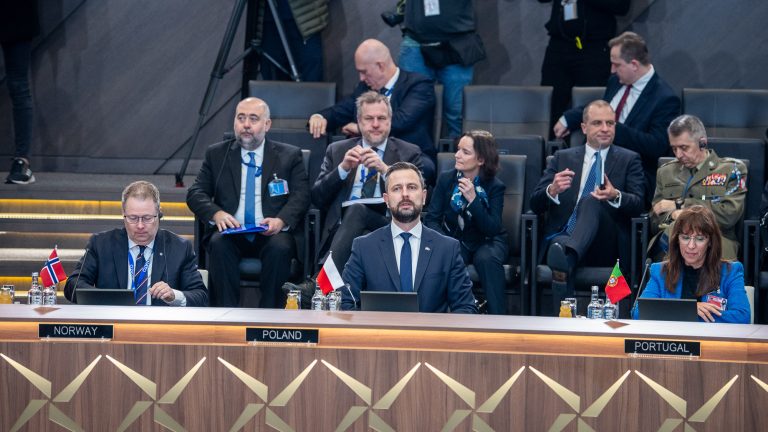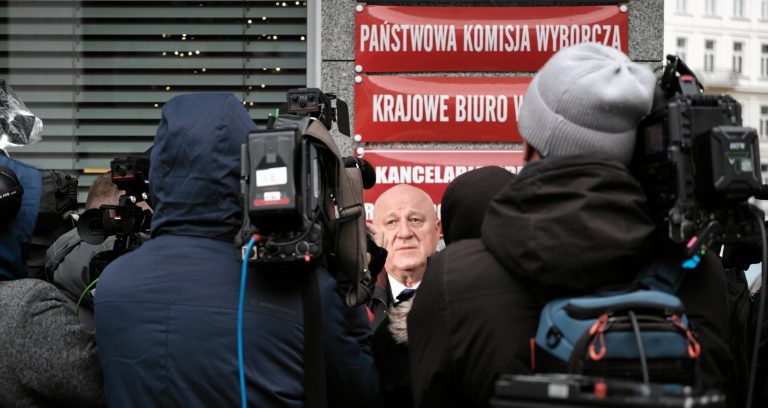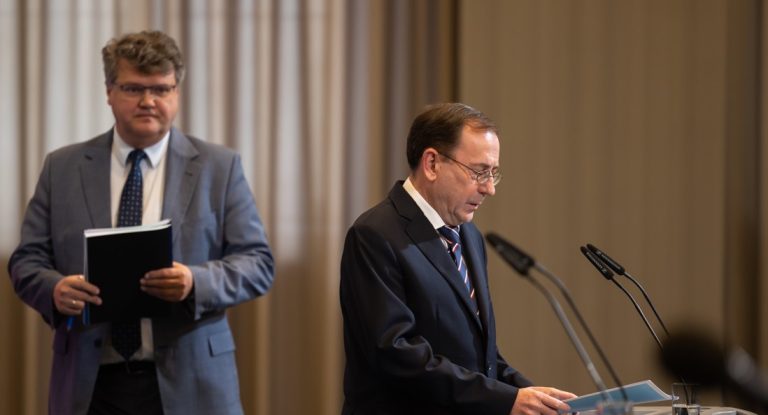Three legal views on the Polish government’s public media takeover

Dramatic scenes from Poland have been beamed around the world in recent days as the new government, in one of its first major acts since taking office, introduced measures to seize control of public broadcasters TVP and Polskie Radio as well as the Polish Press Agency (PAP).
It argued that those steps were both necessary – to “depoliticise” outlets that had been turned into propaganda mouthpieces for the previous ruling Law and Justice (PiS) party – and legal.
Poland’s new government has dismissed the heads of public media outlets and this morning state TV’s news channel went off air.
That prompted a sit-in protest by the former ruling party at TVP headquarters in defence of „media independence and pluralism” https://t.co/YSTbQc6Q65
— Notes from Poland 🇵🇱 (@notesfrompoland) December 20, 2023
The takeover relied on the culture minister, Bartłomiej Sienkiewicz, using commercial law to fire the management of the outlets on the basis that he was the legal representative of the sole shareholder in public media entities, the state treasury. The new ruling coalition also pointed to a 2016 constitutional court ruling finding fault with aspects of the PiS government’s own previous takeover of public media.
However, PiS and President Andrzej Duda, a PiS ally, have argued that Sienkiewicz’s actions were not only an attack on media freedom and pluralism, but also a violation of the law and the constitution. Leading figures from the party, including chairman Jarosław Kaczyński, have joined protests in and around public media offices.
Yet it is not only PiS that has raised concern about the measures. A number of legal experts have also questioned the legality and constitutionality of Sienkiewicz’s actions.
On Friday, the Helsinki Foundation for Human Rights – an NGO that regularly criticised rule-of-law violations under PiS – issued a statement expressing concern at the new government’s actions.
The Helsinki Foundation for Human Rights says the government’s takeover of public media this week „raises serious legal doubts” and may violate Council of Europe standards. @hfhrpl also disputes the culture minister’s legal justification for his actions https://t.co/ZZdb8XyIgh
— Notes from Poland 🇵🇱 (@notesfrompoland) December 22, 2023
Below we present the views of three legal experts on what has taken place.
“Very controversial in legal terms”
Krzysztof Izdebski, senior legal and policy officer at the Stefan Batory Foundation
There is no doubt that something had to be done about the public media. They presented a glaring example of how the media – in particular those that fulfil a public mission – should not act.
It was not just a matter of symbolically attacking opponents of the Law and Justice (PiS) government. Public media were used to gain electoral advantage – a point that has been made repeatedly by, among others, OSCE election monitoring missions. Promoting mainly one political option and restricting access to multiple points of view violated the constitutional principles of freedom of speech and the right to information.
There is nothing to defend here and PiS politicians are probably finding this out quite painfully. We have not seen mass or even numerous protests by citizens in defence of public media, only isolated groups of party activists attempting to build a hysterical vision of Donald Tusk’s takeover of the media by comparing his manoeuvre to the times of communist martial law.
No one apart from the current beneficiaries of the public media feels like defending them. Because there is nothing to defend.
PiS MPs and TVP staff who are occupying one of the broadcaster’s offices in protest against the new government’s takeover celebrated Christmas there, including midnight mass and a traditional Christmas Eve meal pic.twitter.com/PQDumXENNT
— Daniel Tilles (@danieltilles1) December 25, 2023
But could the action to “reclaim” the public media have been better thought out? I don’t know if the effect could have been better, but it certainly could have been tried differently. The choice made by culture minister Bartłomiej Sienkiewicz is very controversial in legal terms.
The public media, although they are commercial law companies, are characterised by such unique features that the authors of the constitution considered it necessary to introduce additional regulations specifying the manner of selecting their management and supervisory boards. And the fulfilment of the mission by radio and television companies is to be supervised by specially designated bodies, headed by the National Broadcasting Council (KRRiT).
The latter was marginalised by the PiS government by stripping it of its competences, which were transferred to the newly established National Media Council (RMN) – a constitutionally dubious body whose only role was to cement PiS’s influence on the media.
A prominent figure from state TV admits they produced „worse propaganda” than under communism to support the ruling party’s election campaign.
But he thinks this „Stalinist logic” backfired and contributed to the negative outcome of the election for PiS https://t.co/8CsLIeVgNz
— Notes from Poland 🇵🇱 (@notesfrompoland) October 18, 2023
And while this process can be described as legal violence, the attempt to reverse the situation using only the competences of the culture minister, as the “owner” of the public media, is not legal either.
The Helsinki Foundation for Human Rights writes about this in more detail in its position paper, pointing out, among other things, that the Constitutional Tribunal (before its full takeover by PiS) emphasised that the minister himself should not have exclusive influence on the staffing of the public media authorities.
On the other hand, in order to effectively restore the independence of public television and radio, there were not many other options. The KRRiT and RMN had been effectively concreted over by PiS.
But the minister could have at least attempted to introduce personnel changes in these bodies and, only after failing to do so, directly dismissed the management and supervisory boards.
There has also been a lack of clear communication as to what the next step will be: what the plan is to guarantee independence, objectivity and pluralism in the public media. The ruling camp, for which public media was supposed to be one of the priorities, seems completely unprepared to present even a general vision of the future of public radio and television.
If the legal actions are dubious then at least a good narrative with a clear vision should have been prepared.
Poland has again reached its lowest ever position in the World Press Freedom Index compiled by Reporters Without Borders.
It has fallen in the ranking every year since 2015, when it achieved a record high of 18th, hitting a new low of 66th this yearhttps://t.co/e9VeXHZfh6
— Notes from Poland 🇵🇱 (@notesfrompoland) May 4, 2022
Meanwhile, for the time being, many – myself included – are anxiously awaiting the decision of the registrar at the National Court Register, who must decide whether to confirm the government’s takeover.
Whatever their decision, the situation will not calm down in the coming weeks. But the kind of public media that PiS chairman Jaroslaw Kaczynski dreamed up will not be seen again, at least anytime soon.
“A decision in line with the constitution”
Michał Romanowski, professor of commercial law, University of Warsaw
The decision of the culture minister to dismiss the authorities of TVP, Polskie Radio and PAP is in line with the Polish constitution.
TVP, Polskie Radio and PAP operate in the form of joint stock companies. The sole shareholder is the Polish State Treasury, which is represented, in accordance with the Polish constitution, by the minister of culture and national heritage.
Pursuant to article 64, the Polish constitution guarantees the owner the protection of property and property rights. One of the basic competences of the owner is the competence to choose who manages his property.
The rules for the removal and appointment of management and supervisory boards in joint-stock companies are set out in the Commercial Companies Code. They confer competence on the owner, in this case the State Treasury.
The government’s takeover of public media this week was a “gross violation of the constitution” and „anarchy [intended] to circumvent the law”, says President Duda.
Some legal scholars and commentators have also raised concern at how it was achieved https://t.co/8SqizPekyT
— Notes from Poland 🇵🇱 (@notesfrompoland) December 21, 2023
Law and Justice (PiS) – the previous ruling party – in order to take over TVP SA, Polskie Radio SA and PAP changed the law so as to have control.
The change vested the exclusive right to appoint the management and supervisory boards of TVP in the National Media Council (RMN) throughout PiS’s period in power, and also after it lost power, excluding the owner, the Polish State Treasury represented by the culture minister and, in the case of TVP SA and Polskie Radio, additionally excluding the National Broadcasting Council (KRRiT).
The KRRiT, in accordance with the Polish constitution, guards freedom of speech, the right to information and the public interest in the public media.
The RMN is a body that is not known to the Polish constitution or the Polish Commercial Companies Code. In practice, the RMN has become a tool for PiS to control public media and the Polish Press Agency. The Constitutional Tribunal ruled in 2016 that this way of appointing authorities in TVP SA and Polskie Radio is contrary to the constitution.
The culture minister, who is constitutionally responsible for the proper management of the State Treasury’s assets in the joint-stock companies TVP, Polskie Radio and PAP, not only had the right but the duty to restore that state in accordance with the constitution.
In addition, TVP SA has announced that it is planning a 2.5 billion zloty (€577 million) loss for 2024, which means that it is bankrupt. The owner cannot therefore fail to act in the face of the company’s mismanagement.
On the last day in office of the outgoing PiS government, changes have been made to the statutes of public media at the request of the culture minister.
The opposition says it is an attempt to prevent the next government from carrying out planned reforms https://t.co/u7wxmkIzqA
— Notes from Poland 🇵🇱 (@notesfrompoland) November 27, 2023
In view of the fact that the supreme law in Poland is the constitution, provisions of laws contrary to the constitution have no binding force. In their place are the general rules for the appointment and dismissal of company authorities by the owner, in this case the State Treasury represented by the minister of culture and national heritage.
The minister referred to the provisions of the Commercial Companies Code. PiS alleges that he violated the constitution because he did so in contravention of the provisions granting such competence to the RMN. These allegations are incorrect. Article 8 of the constitution directly establishes the precedence of the constitution over other laws.
The allegations that the minister thus deprived the public media of its independence are also untrue. Indeed, the Broadcasting Act guarantees the independence of the management boards of TVP SA and Polskie Radio SA from the minister, and the KRRiT has the right to impose very high fines on TVP SA and Polskie Radio for failure to respect freedom of speech and the right to objective information.
Guarantees of independence from political parties, including those forming the government, are also contained in the law on the Polish Press Agency. These provisions remain in force and are binding on the minister of culture and national heritage as the representative of the Polish State Treasury, which is the sole shareholder of TVP SA, Polskie Radio SA and PAP SA.
“A takeover that raises many doubts”
Dominika Bychawska-Siniarska, senior advisor to the Prague Civil Society Center
The takeover of public media in the manner carried out by the government raises many doubts.
Employing corporate law in this context appears to be a tactic that circumvents and overlooks the established division of responsibilities, specifically the National Broadcasting Council’s (KRRiT) designated role in selecting management boards.
The National Media Council Act, which empowers the National Media Council (RMN) to appoint and dismiss public media managers, is still operative. Despite the act’s provisions conflicting with the Constitutional Tribunal’s 2016 findings, it remains legally binding. Ideally, the new parliamentary majority should have annulled it, but President Andrzej Duda would likely not consent to this.
In this context, the National Media Council Act’s provisions are “lex specialis” – specific laws that ought to be enforced. If, hypothetically, the RMN lacks decision-making authority, its responsibilities should shift to the KRRiT, not a member of the government, following the 2016 Constitutional Tribunal’s ruling.
The current situation is as follows: the Sejm referred to the verdict of the Constitutional Tribunal, which stated that a minister of the State Treasury should not dismiss and appoint the bodies of public media. Despite this, the culture minister dismissed and appointed the bodies of the public media, referring to corporate law.
Yesterday’s chaotic takeover of public media highlights the difficulty Poland’s new government faces in repairing captured public institutions without resorting to the same dubious methods that degraded them in the first place, writes @StanleySBill https://t.co/G0OA8OOZZg
— Notes from Poland 🇵🇱 (@notesfrompoland) December 21, 2023
Notes from Poland is run by a small editorial team and published by an independent, non-profit foundation that is funded through donations from our readers. We cannot do what we do without your support.
Main image credit: Roman Bosiacki / Agencja Wyborcza.pl

Agnieszka Wądołowska is deputy editor of Notes from Poland. She has previously worked for Gazeta.pl and Tokfm.pl and contributed to Gazeta Wyborcza, Wysokie Obcasy, Duży Format, Midrasz and Kultura Liberalna






